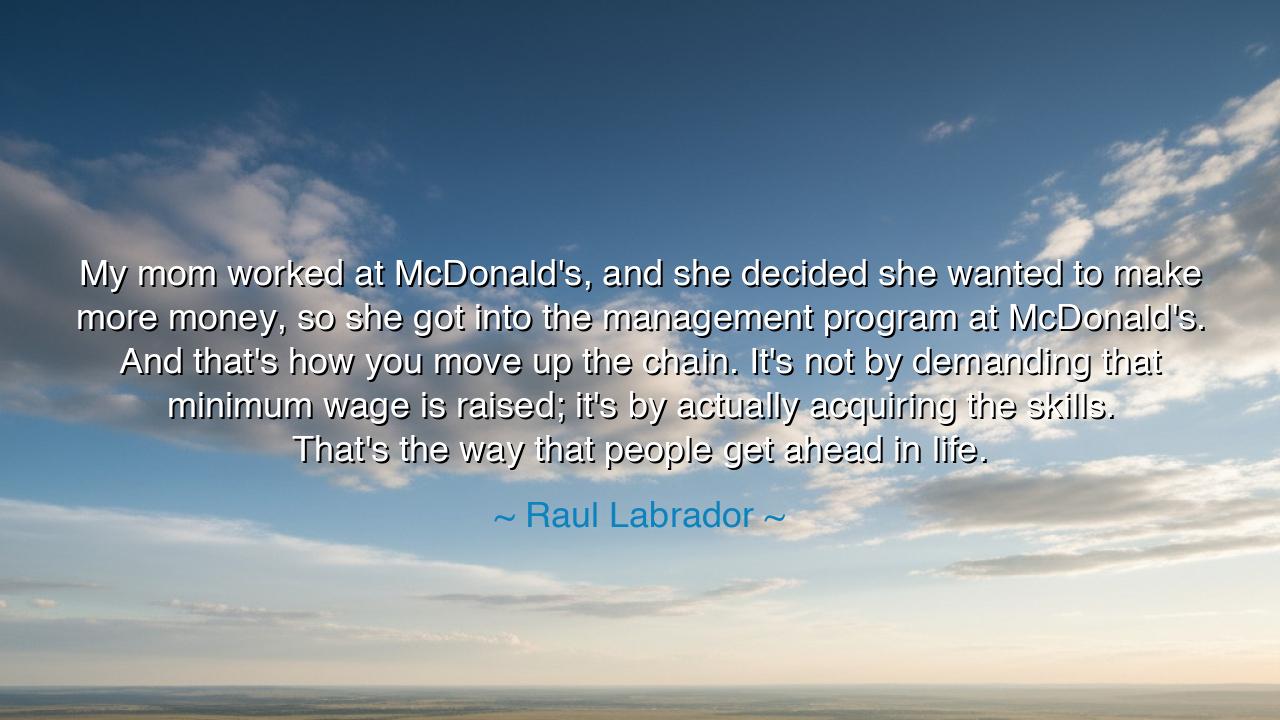
My mom worked at McDonald's, and she decided she wanted to make
My mom worked at McDonald's, and she decided she wanted to make more money, so she got into the management program at McDonald's. And that's how you move up the chain. It's not by demanding that minimum wage is raised; it's by actually acquiring the skills. That's the way that people get ahead in life.






“My mom worked at McDonald's, and she decided she wanted to make more money, so she got into the management program at McDonald's. And that's how you move up the chain. It's not by demanding that minimum wage is raised; it's by actually acquiring the skills. That's the way that people get ahead in life.” — thus spoke Raul Labrador, a man shaped by both the humbleness of his origins and the rigor of his beliefs. Beneath these words lies a timeless lesson, older than any nation or system: that growth comes not from demand, but from discipline; that progress is born of perseverance and the courage to learn. His mother’s story is not only a personal tribute but a parable — the tale of how a single choice, made with resolve, can transform one’s destiny.
From the earliest days of civilization, this truth has been written in the deeds of the great. The ancients revered not those born to fortune, but those who earned their greatness. The philosopher Socrates began as a sculptor’s son; Cincinnatus, who saved Rome, once plowed his own field. Each rose not by privilege, but by mastering their craft and serving something larger than themselves. So too did Raul Labrador’s mother — a woman of quiet might — take her place in that lineage. Working not with sword or scroll, but with determination and skill, she showed that dignity resides not in the grandeur of the task, but in the spirit with which one labors.
Her story reflects an eternal law: that to rise, one must build from within. “Acquiring the skills”, as Labrador says, is not merely about employment; it is about self-mastery. Skills are the tools by which we carve our place in the world. When one learns, one gains power — the power to adapt, to contribute, to transcend one’s circumstance. To seek external change without internal growth is to build a house on shifting sand. The wise know that while the world may be unjust, effort is still the surest path to freedom. The mother who chose to learn rather than complain became a symbol of this truth — that endurance and education are the roots of advancement.
Let us look, too, to history for proof of this principle. Booker T. Washington, born into slavery, built his life on the foundation of self-improvement and practical skill. Through education, discipline, and relentless faith in work’s dignity, he rose from bondage to become one of America’s great teachers. Like Labrador’s mother, Washington believed that no system, however powerful, could suppress a person who continually cultivates their abilities. His message, echoing through generations, remains the same: “Character, not circumstance, makes the man.” Both he and Labrador’s mother understood that progress demands more than protest — it demands preparation.
Yet this quote is not without its shadow of sorrow, for it speaks of a hard truth — that life seldom bends to fairness, and that opportunity is earned in struggle. The mother who rose through McDonald’s ranks did not wait for ease or entitlement; she chose effort over resentment. Her victory was not given, but won — and in that victory lies the true meaning of freedom. For freedom is not only the right to dream, but the will to pursue that dream through hardship. Those who wait for the world to change will grow bitter; those who change themselves will grow strong.
Still, there is gentleness in this teaching. To “move up the chain” is not to scorn those who struggle, but to remind them of their power. Every act of learning, every step of discipline, is a rebellion against despair. The path may be slow, but it is sacred — for each new skill, each earned victory, builds not only prosperity but character. To work with one’s hands, to lead with one’s mind, to persist with one’s heart — this is the true nobility of humankind. The ancient builders of cathedrals, who toiled for decades knowing they would never see the final spire, would have understood this mother’s courage.
So, my child, take this lesson to heart. Do not wait for the world to lift you; lift yourself. When life offers little, learn much. When doors are closed, build new keys. Seek wisdom in your work, mastery in your effort, and dignity in your labor. The path upward may be narrow, but every skill, every act of discipline, widens it a little more. For as Raul Labrador reminds us through the story of his mother — progress is not a gift given by others, but a power grown within. And those who cultivate that power, quietly and faithfully, will one day rise beyond every chain the world once set before them.






AAdministratorAdministrator
Welcome, honored guests. Please leave a comment, we will respond soon